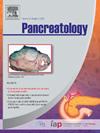Association between intra-tumoral microbiome and genetic alterations in intraductal papillary mucinous neoplasms of the pancreas
IF 2.7
2区 医学
Q2 GASTROENTEROLOGY & HEPATOLOGY
引用次数: 0
Abstract
Background/objectives
We previously demonstrated that intra-tumoral microbiome infection may affects the clinicopathological characteristics of pancreatic intraductal papillary mucinous neoplasms (IPMNs) and showed that these characteristics are also influenced by gene mutations. The aim of this study was to investigate whether specific microbiome infections lead to alterations in the expression of specific genes in IPMNs.
Methods
DNA was extracted from 26 resected IPMN samples and subjected to genetic mutation assessment and microbiome analysis. The relationship between intra-tumoral microbiome and genetic alterations was investigated.
Results
There was an increasing trend in the percentage of Firmicutes in KRAS- and GNAS-mutated IPMNs, whereas Proteobacteria tended to decrease in KRAS-mutated IPMNs. KLF4-mutated IPMNs, particularly within the KRAS-mutated group, had significantly low α-diversity (p < 0.05). The relative abundance of Firmicutes and Proteobacteria was significantly higher in KLF4-mutated IPMNs, especially in KLF4-mutated IPMNs among the KRAS-mutated groups. An increased relative abundance of Firmicutes and Proteobacteria, along with the associated reduction in microbial diversity, was associated with a higher frequency of gene mutations, including KLF4.
Conclusions
This study suggest that the intratumoral microbiome may be linked to the genetic characteristics of IPMNs and potentially contribute to their malignant progression.
胰腺导管内乳头状黏液性肿瘤肿瘤内微生物组与遗传改变的关系。
背景/目的:我们先前证明肿瘤内微生物组感染可能影响胰腺导管内乳头状粘液瘤(IPMNs)的临床病理特征,并且这些特征也受到基因突变的影响。本研究的目的是研究特异性微生物组感染是否会导致IPMNs中特异性基因表达的改变。方法:从26例IPMN切除标本中提取DNA,进行基因突变评估和微生物组分析。研究了肿瘤内微生物组与遗传改变的关系。结果:KRAS-和gnas -突变IPMNs中厚壁菌门百分比呈上升趋势,而变形菌门百分比呈下降趋势。klf4突变的ipmn,尤其是kras突变组,α-多样性显著降低(p < 0.05)。在klf4突变的ipmn中,厚壁菌门和变形菌门的相对丰度显著更高,尤其是在kras突变组中klf4突变的ipmn中。厚壁菌门和变形菌门的相对丰度增加,以及微生物多样性的相关减少,与包括KLF4在内的基因突变的更高频率相关。结论:本研究提示肿瘤内微生物组可能与IPMNs的遗传特征有关,并可能促进其恶性进展。
本文章由计算机程序翻译,如有差异,请以英文原文为准。
求助全文
约1分钟内获得全文
求助全文
来源期刊

Pancreatology
医学-胃肠肝病学
CiteScore
7.20
自引率
5.60%
发文量
194
审稿时长
44 days
期刊介绍:
Pancreatology is the official journal of the International Association of Pancreatology (IAP), the European Pancreatic Club (EPC) and several national societies and study groups around the world. Dedicated to the understanding and treatment of exocrine as well as endocrine pancreatic disease, this multidisciplinary periodical publishes original basic, translational and clinical pancreatic research from a range of fields including gastroenterology, oncology, surgery, pharmacology, cellular and molecular biology as well as endocrinology, immunology and epidemiology. Readers can expect to gain new insights into pancreatic physiology and into the pathogenesis, diagnosis, therapeutic approaches and prognosis of pancreatic diseases. The journal features original articles, case reports, consensus guidelines and topical, cutting edge reviews, thus representing a source of valuable, novel information for clinical and basic researchers alike.
 求助内容:
求助内容: 应助结果提醒方式:
应助结果提醒方式:


